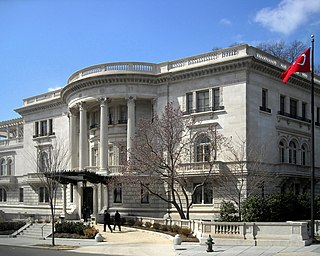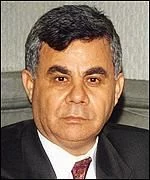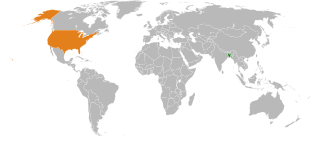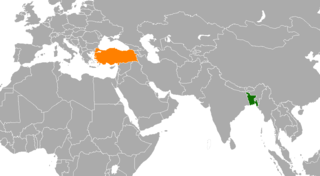Related Research Articles
As one of the oldest Euro-Atlantic member states in the region of Southeast Europe, Greece enjoys a prominent geopolitical role as a middle power, due to its political and geographical proximity to Europe, Asia, the Middle East and Africa. Its main allies are the United States, the United Kingdom, France, Italy, Cyprus and the rest of the European Union and NATO.

The Islamic Republic of Pakistan emerged as an independent country through the partition of India in August 1947 and was admitted as a United Nations member state in September 1947. It is currently the second-largest country within the Muslim world in terms of population, and is also the only Muslim-majority country in possession of nuclear weapons. De facto, the country shares direct land borders with India, Iran, Afghanistan, and China.

The foreign relations of Romania are conducted by the Ministry of Foreign Affairs. Romania is a member of the European Union and NATO.

The Seychelles follows a policy of what it describes as "positive" nonalignment and strongly supports the principle of reduced superpower presence in the Indian Ocean. The Seychelles' foreign policy position has placed it generally toward the left of the spectrum within the Non-Aligned Movement. Russia, the United Kingdom, France, India, the People's Republic of China, Libya and Cuba maintain embassies in Victoria.

Physically bridging Europe and Asia and being above Africa, Turkey is a secular country that has historically pursued a Western-oriented foreign policy. To this end, Turkey uses its global diplomatic network—the third most extensive—of 252 diplomatic and consular missions.
The foreign relations of Albania are its relations with other governments and peoples. Foreign relations are conducted through the Ministry of Foreign Affairs in Tirana. The current minister is Igli Hasani. The current Ambassador to the United Nations is Ferit Hoxha.

Geography is an important factor in informing Iran's foreign policy. Following the 1979 Iranian Revolution, the newly formed Islamic Republic, under the leadership of Ayatollah Khomeini, dramatically reversed the pro-American foreign policy of the last Shah of Iran Mohammad Reza Pahlavi. Since the country's policies then oscillated between the two opposing tendencies of revolutionary ardour to eliminate non-Muslim Western influences while promoting the Islamic revolution abroad, and pragmatism, which would advance economic development and normalization of relations, bilateral dealings can be confused and contradictory.

The foreign relations of Bangladesh are Bangladesh's relationships with foreign countries. The Government of Bangladesh's policies pursue a moderate foreign policy that heavily relies on multilateral diplomacy, especially at the United Nations (UN) and the World Trade Organization (WTO). Since its independence in 1971, Bangladesh has stressed its principle of "Friendship towards all, malice towards none" in dictating its diplomacy. As a member of the Non-Aligned Movement, Bangladesh has tended to not take sides with major powers. Since the end of the Cold War, Bangladesh has pursued better relations with its neighbours and other nearby states.

Sheikh Mujibur Rahman, popularly known by the honorific prefix Bangabandhu, was a Bangladeshi politician, revolutionary, statesman, activist and diarist. As a politician, Mujib had held continuous positions either as Bangladesh's president or as its prime minister from April 1971 until his assassination in August 1975. Mujib successfully led the Bangladeshi independence movement and restored Bengali sovereignty after over two centuries following the Battle of Plassey in 1757, for which he is honoured as the "Father of the Nation" in Bangladesh who declared independence. In the 2004 BBC opinion poll, Mujib was voted as the Greatest Bengali of all time.

Muhammad Mustafa Mero was a Syrian politician who served as Prime Minister of Syria from 7 March 2000 to 10 September 2003.

Bangladesh-United States relations are the bilateral relations between Bangladesh and the United States of America. For the United States, Bangladesh is the 38th largest goods supplier and 60th largest export market. For Bangladesh, the United States is the largest export market. The two countries signed a bilateral investment treaty in 1986. U.S. companies are the largest foreign investors in Bangladesh. The U.S. government is the leading contributor of humanitarian assistance in response to the Rohingya crisis. Both nations have announced similar views for a Free and Open Indo-Pacific.

China–Syria relations are foreign relations between China and Syria. The nationalist government of China recognized Syria in 1946. Diplomatic relations between both countries were established on August 1, 1956. China has an embassy in Damascus and Syria has an embassy in Beijing, the two governments generally maintaining a friendly political and economic relationship for the last several decades, which continues to endure despite the Syrian civil war.

Bangladesh–Germany relations are the bilateral relations between Bangladesh and Germany. Germany has an embassy in Dhaka, and Bangladesh has one in Berlin.

Bangladesh–Turkey relations are the bilateral relations between Bangladesh and Turkey. Both countries are members of the Organisation of Islamic Cooperation. Turkey has an embassy in Dhaka and Bangladesh has one in Ankara and a consulate in Istanbul.

Bangladesh and Israel do not have diplomatic relations. Bangladesh has stated that it will not recognize Israel until there is an independent Palestinian state. Some reports have alleged that Bangladesh and Israel maintain some trade relations indirectly and sometimes secretly and via proxies, although the Bangladesh government denies these allegations.

Bilateral relations between Bangladesh and Palestine are close and cordial. Bangladesh has been a consistent supporter of the Palestinians right to an independent state, and has no diplomatic relations with Israel. Furthermore, Bangladesh offers scholarships to young Palestinians, and the two countries co-operate on military affairs.

Bangladesh–Syria relations refer to the bilateral relations between Bangladesh and Syria. Syria is accredited to Bangladesh from its embassy in New Delhi. Bangladesh has an consulate-general in Damascus.
References
- ↑ United States Department of State (2003). Diplomatic List. Department of State. p. 2001.
- 1 2 3 "Mission History of the Embassy of Turkey in Dhaka" . Retrieved 20 May 2023.
- ↑ Lambert's World of Trade, Finance & Economic Development. Lambert Publications, Incorporated. 1984. p. 75.
- ↑ Sauvant, Karl P.; Müller, Joachim W., eds. (1981). The Third World Without Superpowers, Second Series: The Collected Documents of the Group of 77. Oceana Publications. p. 219. ISBN 978-0-379-00969-9.
- ↑ Europa Publications (December 1993). The Far East and Australasia. Routledge. p. 124. ISBN 978-0-946653-90-4.
- ↑ "Ferit Ergin: A diplomat with passion for Bangladeshi music". The Daily Star. 11 March 2005. Retrieved 2023-05-20.
- ↑ Europa Publications (2002). The Europa World Year Book 2002. Taylor & Francis Group. p. 650. ISBN 978-1-85743-128-5.
- ↑ Europa Publications (2007). The Europa World Year Book 2007. Routledge. p. 755. ISBN 978-1-85743-413-2.
- ↑ Zisser, Eyal; Feierstein, Gerald M.; Karsh, Efraim; Hallward, Maia; Biygautane, Taib; Barany, Zoltan; Harari, Michael; Scham, Paul; Sinai, Joshua (2022-12-01). TRANSATLANTIC POLICY QUARTERLY - FALL 2022 - VOL. 21 NO. 3: The Changing Dynamics of Israel's Foreign Policy. Transatlantic Policy Quarterly. p. 136.
- ↑ "Dhaka not happy with Ankara". The Daily Star. 2012-12-27. Retrieved 2023-05-20.
- ↑ "Turkey's death penalty politics". Al Arabiya. 2013-12-14. Retrieved 2023-05-20.
- ↑ "Mevlüt Çavuşoğlu: Hatay temsilcimiz Devrim Öztürk'e henüz ulaşamadık". birgun.net (in Turkish). Retrieved 2023-05-20.
- ↑ Anas, Omair (2022-02-21). Turkey's Asia Relations. Springer Nature. p. 79. ISBN 978-3-030-93515-3.
- ↑ "Harvesting 'Empathy for Humanity' through the construction of a field hospital "Together for Turkey"". The Bangladesh Today. Retrieved 2023-05-20.